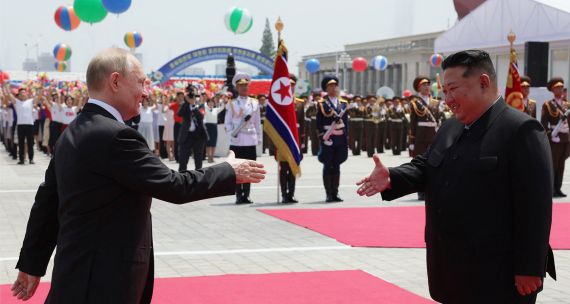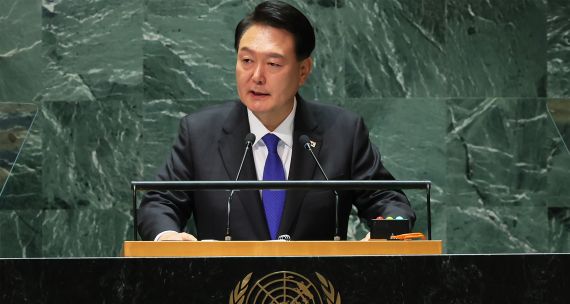It was not supposed to happen. Backed by a full phalanx of America's top generals and a powerful mandate to "make America great again," U.S. President Donald Trump repeatedly pounded his fist on the podium, warning that letting North Korea have nuclear-armed intercontinental ballistic missiles (ICBMs) was "not going to happen," and that North Korea would be stopped by a great "armada" and with "fire and fury" of the sort the world has never seen. Less worried about the missiles but determined to stop North Korea's nuclear development because of its potential to trigger a nuclear arms race in Asia, China's President Xi Jinping has repeatedly warned Kim Jong-un in strong terms not to go ahead with his sixth underground nuclear test, especially a thermonuclear one.
And yet, it has happened. Welcome to the end of innocence. In the past three months alone, Mr. Kim has tested the new Hwasong-12 advanced intermediate range missile (IRBM) several times, flying the last one right over Japanese territory – the first missile overflight of Japan since 2009 (and the previous two cases in 1998 and 2009 were technically satellite launches).
He has also tested twice a new and surprisingly advanced ICBM, the Hwasong-14, sending it on vertical trajectories nearly 3,000 kilometres high. And he just detonated a new type of thermonuclear bomb with a destructive power eight-to-10 times greater than the 1945 Hiroshima bomb. The resulting blast triggered a magnitude-6.3 earthquake that shook homes in Chinese border cities at the very moment President Xi was opening the BRICS Summit in China with such global notables as Indian Prime Minister Narendra Modi and Russian President Vladimir Putin. Even worse, Mr. Kim may well proceed in short order with one or more direct tests of the Hwasong-14 ICBM with a real trajectory across the North Pacific (and above Japan, again).
So, what has Mr. Kim unleashed and what happens next? Clearly, the mood in Washington on Sunday, the day after the underground test, was furious. The prevailing mood among policy insiders was angry: This time, Kim Jong-Un has gone too far and has to face a price; what he just did is incredibly provocative. Capping this, the U.S. ambassador to the UN, Nikki Haley, stated that Mr. Kim was "begging for war." The mood in Beijing was also furious, given the direct humiliation of Mr. Xi vis-a-vis the timing of the H-bomb test. And the situation is even worse for President Moon Jae-in in South Korea, who has offered engagement to slow North Korea, and for Prime Minister Shinzo Abe in Japan, who provoked helpless panic in the country by triggering a wartime alert during the Hwasong-12 overflight.
The energy and frustration unleashed in Washington is now such that Mr. Trump cannot accept such provocation without a counterpunch and remain credible as the leader of "America the Great." War on the Korean Peninsula is possible for the first time since 1953 (and the brief threat of war in 1994). According to intelligence estimates in the United States and South Korea , North Korea has now mastered miniaturization of its nuclear weapons but does not yet have operational ICBMs armed with nuclear weapons. At the current pace, it may well have that capability in one year or so. Should the United States take advantage of this window of opportunity to seek to disarm the mad dictator with nukes?
Most analysts agree, however, that launching such a pre-emptive attack would trigger a devastating counterattack on Seoul (with more than 10,000 North Korean artillery pieces and rocket launchers dug into the mountains just above Seoul), on U.S. bases in South Korea, possibly on some of the 24 nuclear reactors operated by South Korea, and on U.S. bases in Japan or Japanese cities. Can a U.S. president sacrifice Seoul for the long-term protection of the U.S. mainland?
Crises of this magnitude also tend to induce miscalculations in the minds of leaders and seduce them with tempting scenarios. Maybe North Korea is a paper tiger? Maybe a first surprise attack might actually work and destroy most North Korean capabilities? Well, history – from 1914 and 1950, in particular – teaches us that things never go according to plan and that wars take on a life of their own, swallowing even the best scenarios in their destructive, spiralling effects.
Mr. Trump is surrounded by solid advisers and has displayed rational behaviour at key international summits this year, but his immense frustrations will demand action this week. There remains only one powerful option for a robust response, short of war: an oil embargo on North Korea. Ninety per cent of North Korea's oil comes through China. China has refused to escalate sanctions to that level, not only to thwart a possible regime collapse and refugee crisis in North Korea, but also because North Korea has threatened to direct some of its missiles at China if China allows an oil embargo. It is easy to forget that the U.S. oil embargo on Japan (in response to Japan's invasion of French-controlled Vietnam) that triggered Pearl Harbor in 1941.
Mr. Trump is now so determined to take out his wrath on someone that he is threatening a complete trade embargo on China if Beijing does not make a decisive move on North Korea. The cost is escalating. For the first time, it is conceivable that China will accept an oil embargo on North Korea in the coming week or so at the UN Security Council. China would then seek to calibrate that embargo, both in terms of definition and implementation, so as to prevent both North Korean collapse and North Korean attacks on China.
In the end, an oil embargo will prove too little too late, given Mr. Kim's determination to get to the finish line with nukes deployed on ICBMs and IRBMs. As Mr. Putin crudely put it on Sept. 5, "They'd rather eat grass than give up their nuclear program" and pre-empt regime change.
If we can avoid the siren song inviting us to a disastrous war, the only way out of the current crisis will be negotiations toward a stable North Korean order that will likely have to accept some nuclear capability in North Korea (at least in the short-to-mid term) in exchange for a cap on development, secure command, control and emergency procedures, and diplomatic opening. The Trump administration and the U.S. military, however, are a long way from readiness to accept this brokered reality, and the coming couple of months will prove extremely dangerous and volatile. But the reality is already upon us: the ugly duckling Mr. Kim has deterred the mighty United States.
And this is where Canada may have a role to play. Given its past and current links, Canada has a good understanding of decision-making and priorities in North Korea, as well as some credibility. It may be the time to think through scenarios and options where Canada could propose blueprints and processes for a stabilization of the situation. The stakes are very high right now and Canada should do more than repeat belligerent calls that we cannot back with real force, or set a course of indifference. Canadian diplomatic networks in the region are without peer, and the benefits of being part of creative and innovative long-term solutions would be very large.
This piece was first published in The Globe and Mail on September 6, 2017.



